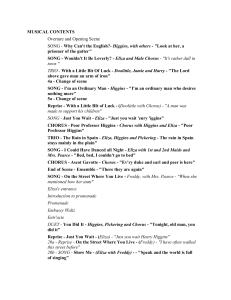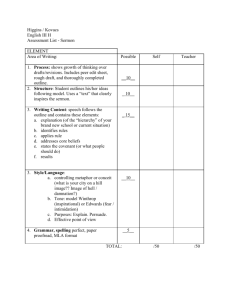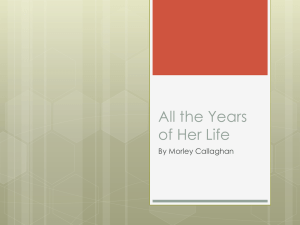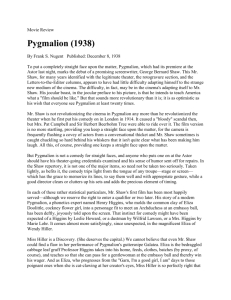It was raining heavily in Covent Garden. Under the entrance of St
advertisement
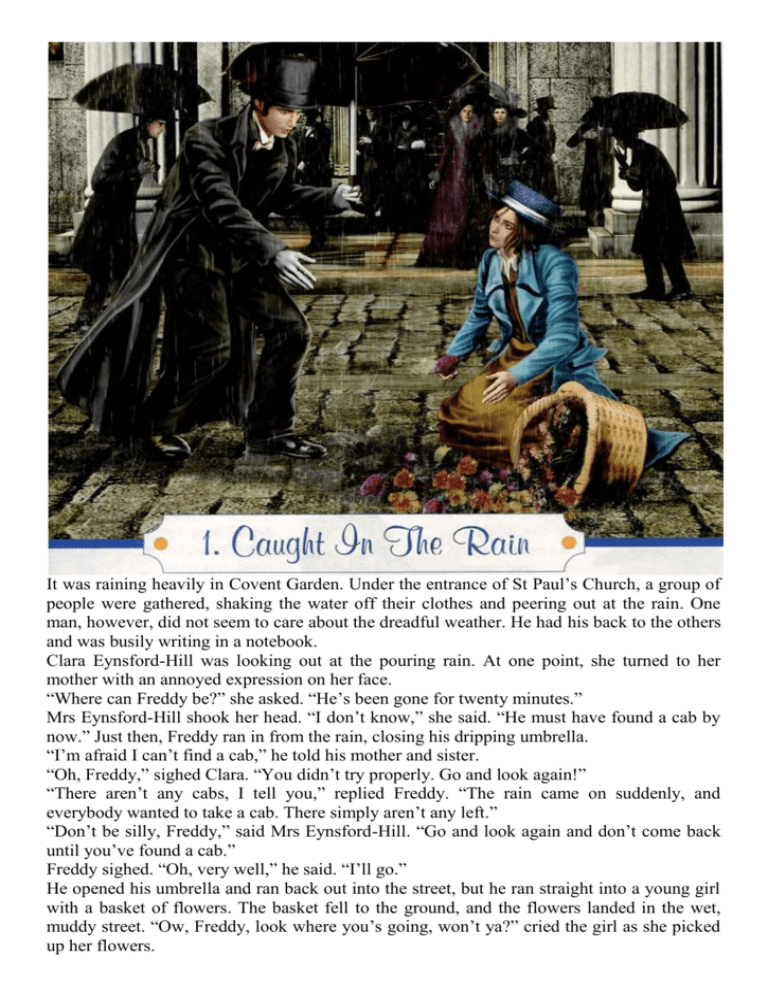
It was raining heavily in Covent Garden. Under the entrance of St Paul’s Church, a group of people were gathered, shaking the water off their clothes and peering out at the rain. One man, however, did not seem to care about the dreadful weather. He had his back to the others and was busily writing in a notebook. Clara Eynsford-Hill was looking out at the pouring rain. At one point, she turned to her mother with an annoyed expression on her face. “Where can Freddy be?” she asked. “He’s been gone for twenty minutes.” Mrs Eynsford-Hill shook her head. “I don’t know,” she said. “He must have found a cab by now.” Just then, Freddy ran in from the rain, closing his dripping umbrella. “I’m afraid I can’t find a cab,” he told his mother and sister. “Oh, Freddy,” sighed Clara. “You didn’t try properly. Go and look again!” “There aren’t any cabs, I tell you,” replied Freddy. “The rain came on suddenly, and everybody wanted to take a cab. There simply aren’t any left.” “Don’t be silly, Freddy,” said Mrs Eynsford-Hill. “Go and look again and don’t come back until you’ve found a cab.” Freddy sighed. “Oh, very well,” he said. “I’ll go.” He opened his umbrella and ran back out into the street, but he ran straight into a young girl with a basket of flowers. The basket fell to the ground, and the flowers landed in the wet, muddy street. “Ow, Freddy, look where you’s going, won’t ya?” cried the girl as she picked up her flowers. “Sorry!” said Freddy and ran off to look for a taxi. “Well, there’s rude for ya!” said the girl as she sat at the foot of a column in the church entrance. Mrs Eynsford-Hill looked at the girl. “Excuse me,” she said. “But how do you know my son’s name?” “Ow, he’s your son, is he?” said the girl. “Well, you didn’t taught him no manners, did ya? He done spoil my flowers and didn’t paid me for them. Will you pay me?” Clara Eynsford-Hill took hold of her mother’s arm. “Don’t give her any money, Mother,” she said. “You shouldn’t give her anything.” “Please be quiet, Clara,” said Mrs Eynsford-Hill. “Have you got any pennies?” “No,” said Clara. “I’ve only got sixpence.” Mrs Eynsford-Hill took the coin from her daughter and gave it to the flower girl. The girl took the coin quickly. “Thank ya, lady!” she cried. “Make her give you the change, Mother,” said Clara. “Those flowers are only a penny a bunch.” Mrs Eynsford-Hill ignored her daughter. “You can keep the change,” she said to the girl, “but please tell me how you know my son’s name.” “I don’t!” replied the flower girl. “I only called him Freddy or Charlie, same as I’d call any stranger when I wanted to be friendly.” “Really, Mother!” said Clara in disgust. “What a waste of a sixpence!” Mrs Eynsford-Hill and her daughter walked away from the flower girl, leaving her sitting at the base of one of the church columns. The girl watched as an elderly gentleman rushed out of the rain, closing his wet umbrella and shaking the water from his clothes. “Be a gentleman, sir, and buy a flower off a poor girl,” said the flower girl. “I’m sorry, I haven’t any change,” said the gentleman. He felt around in his coat pocket. “No, wait! Here’s three pence. You can have that.” “You’d better give him a flower for his money,” said a bystander. “There’s a man here writing down every word you’re saying.” The flower girl jumped up, terrified. “I ain’t done nothing wrong! All I done is ask the gentleman to buy a flower. Oh, sir, don’t let him charge me!” cried the girl almost hysterically, addressing the gentleman. “There, there! Who’s hurting you, you silly girl? What do you take me for?” said the note taker coming forward. “Don’t worry, girl,” said the man trying to help her. “He ain’t a policeman. Are you?” “Do I look like a policeman?” said the man with the notebook. “Now tell me, young man, how is life in Selsey?” “How do you know I’m from Selsey?” asked the bystander. “Are you a fortune teller? Do someone else! Where does he come from?” He pointed at the elderly gentleman. “Cheltenham, Harrow, Cambridge and India,” said the man with the notebook. “Quite right!” exclaimed the gentleman. “How on earth did you know that?” “It’s simple phonetics. It’s the science of speech. It’s my job and also my hobby. I can tell where anyone comes from by the way they speak.” “But can you make a living doing that?” asked the gentleman. “Avery good one, actually,” said the man with the notebook. He turned and pointed to the flower girl. “You see this creature here, with her terrible English? In just three months I could pass her off as a duchess. I could even get her a place as a shop assistant, which requires better English.” “Well, that’s very interesting,” said the gentleman. “I’m an expert on Indian dialects myself.” “Are you?” interrupted the man with the notebook. “Do you know Colonel Pickering? He wrote a book about Indian dialects.” “I am Colonel Pickering!” he exclaimed. “Who are you?” “I’m Professor Henry Higgins.” “Well, I never!” laughed the Colonel. “I came to London to meet you!” “How wonderful!” said Professor Higgins. “Come and see me tomorrow. I live at 27A Wimpole Street. Look, the rain has stopped now, so I must go. I look forward to seeing you in the morning.” As the two men left the shelter of the church entrance, the flower girl called up to them. “Buy a flower before you goes!” Professor Higgins threw a handful of coins into the girl’s basket, and she picked them up, staring at the money in wonder. Colonel Pickering visited Professor Higgins the next day, and the two men sat in Higgins’ study and discussed the wide variety of Indian dialects. Higgins played records of different dialects on his phonograph, and the two men listened with interest. There was a knock at the study door, and Higgins’ housekeeper, Mrs Pearce, entered the room. “What is it, Mrs Pearce?” asked Professor Higgins. “There’s a young woman here to see you, sir.” “A young woman!” exclaimed Higgins. “What does she want?” “Well, she’s a very common girl, sir. I tried to send her away, but she says you’ll be glad to see her.” “I see,” said Higgins. “Does she have an interesting accent?” “Oh, it’s dreadful, sir,” said Mrs Pearce. “Very well!” said Higgins. “Send her in!” He rushed across to the table and picked up a new cylinder to use on his phonograph. “This is lucky!” he said to Colonel Pickering. “Now I can show you how I make records!” Mrs Pearce returned and showed in Higgins’ visitor. It was the flower girl from Covent Garden. “Oh no!” said Higgins. “This is the girl I met last night. I’ve already recorded her accent so she’s no use. Get out, girl! I don’t want you here.” “Don’t you be so rude to me,” said the girl. “You ain’t heard why I come here yet. I’m come to have lessons, I am, and, if you was a gentleman, you might ask me to sit down.” The two men stared at her, amazed. “Pickering, shall we ask her to sit down or shall we throw her out?” “Do sit down,” said Colonel Pickering gently. “Now tell us, what is it you want?” “I wants to be a lady. He said he could make me one. So, here I am, ready to pay him for lessons.” “What's your name?” asked Professor Higgins. “Eliza Doolittle.” “And how much do you intend to pay me for the lessons, Eliza?” “Well, a friend of mine gets French lessons for eighteen pence an hour. I ain’t paying as much to learn my own language, so I won’t give more than a shilling. Take it or leave it.” “A shilling,” murmured Higgins. “Do you know, Pickering, that a shilling is about forty percent of her daily income! If a millionaire paid me forty percent of his daily income for a lesson, he would pay me sixty pounds!” The flower girl jumped up in horror. “Sixty pounds!” she cried. “I never said nothing about sixty pounds! I ain’t got sixty pounds!” She fell back into her chair and started to sob, wiping her nose on her sleeve. “Oh, please be quiet,” said Higgins. “And take this.” He handed her his handkerchief. “What’s this for?” asked Eliza, taking the white square of material from the Professor. “It’s to wipe your eyes and any other part of your face that feels wet,” said Higgins. “Remember, this is your handkerchief and that’s your sleeve. Don’t confuse the two if you want to become a lady.” Colonel Pickering stared at the flower girl with interest. “Higgins, I have an idea!” he said. “You’re the greatest teacher alive. Do you think you can make this girl into a lady in time for the Ambassador’s party? I’ll bet you all the expenses of the experiment you can’t do it, and I’ll pay for the lessons!” Now, Eliza stared at Colonel Pickering. “Oh! You’re a real gentleman!” she cried. The Professor was tempted. “It’s certainly an interesting experiment! She’s so very common ... so very dirty!” “Ow! I ain’t dirty!” cried Eliza. “I washed my face and hands before I come, I did!” Higgins did not seem to hear her. “I shall do it!” he said. “I shall make this awful creature into a lady!” “Aaaaah-ow!” cried Eliza. Higgins became excited. “Yes, in just six months, I shall be able to take her anywhere and make people believe she’s a duchess! Take her away and clean her up, Mrs Pearce! Take all her clothes and burn them. Call and order some new ones and wrap her in brown paper until they arrive!” “Ow! You’re no gentleman, you’re not! I’m a good girl, I am!” cried Eliza. “Now, now, young lady,” said Higgins. “You’ve got to learn how to behave like a duchess. Take her away, Mrs Pearce.” “But I haven’t got anywhere to put her,” said Mrs Pearce. “Then put her in the dustbin!” said Higgins. “Aaaaah-ow!” cried Eliza again. “Oh, Professor Higgins,” said Mrs Pearce, taking the Professor to one side. “You can’t do this. You don’t know anything about this girl. She may be married!” “Married!” interrupted Eliza. “Who’d marry me?” “My word, Eliza!” said Higgins, suddenly becoming friendly towards the poor girl. “There will be a queue of men outside this door waiting to marry you by the time I’ve finished with you!” “Oh, do be sensible, Professor,” said Mrs Pearce. “You must think about what will happen to this girl. Are you going to pay her wages? And where will she go when you finish your experiment?” “When I’ve finished with her, she can go anywhere she likes and do anything she likes!” cried Higgins. “She will be a lady! What do you think of that, Eliza?” “Well...,” said Eliza. “You shall stay with me for the next six months,” said Higgins, “and you will learn how to speak beautifully. At the end of six months, we shall go to the Ambassador’s ball. If anyone finds out you’re not a lady, I shall lose my bet. But if they believe that you are a lady, then you shall have a present of seven-and-sixpence to start life with as a lady in a flower shop. What do you think?” “I think you’d better let me speak to the girl in private,” said Mrs Pearce. “Very well, Mrs Pearce!” said Higgins. “Take her off to the bathroom and clean her up.” “You’re a bully, you are!” cried Eliza as Mrs Pearce led her out of the room. “I won’t stay here if I don’t like it! I’m a good girl, I am!” Professor Higgins and Colonel Pickering were sitting by the fire when Mrs Pearce returned to the room. “Is the girl clean yet?” asked Higgins. “Yes, sir,” replied Mrs Pearce, “but I’m afraid we have another problem now. There’s a Mr Alfred Doolittle here to see you. He says you have his daughter.” “Very well. Send the man in,” said Higgins resolutely. Mrs Pearce left the room and, when she returned, she was followed by an elderly man in extremely dirty clothes. Alfred Doolittle was a dustman but he did not seem to feel uncomfortable in a rich man’s home. He looked at the two gentlemen as he entered the room. “Professor Higgins?” he asked. “Here,” said Higgins. “Do sit down.” Alfred sat in a large armchair, as if he was used to such comfort. “I come about a very serious matter,” he said. “I want my daughter.” “Of course you do,” said Higgins. “You’re her father, aren’t you, and I don’t imagine anyone else wants her. She’s upstairs. Take her away at once.” This was not the reaction Alfred had expected. He stood up, startled. “What do you mean?” he asked. “Well, I’m not going to keep your daughter for you!” said Higgins. “Take her away! How dare you come here and try to blackmail me?” “Blackmail you? What are you talking about?” asked Alfred. “You sent her here on purpose!” said Higgins. “You want money! I shall call the police!” He moved towards the telephone, and Alfred put a hand out to stop him. “Now wait a second!” cried Alfred. “I never said nothing about money!” “Well, what else have you come here for?” asked Higgins. “How did you know she was here?” “I’ll tell you if you’ll only let me get a word in,” said Alfred. “I’m willing to tell you. I’m wanting to tell you. I’m waiting to tell you.” “Listen, Pickering,” Higgins said, turning to the Colonel. “This man has a natural gift for public speaking. Alfred, do go on with your story.” “Well,” continued Alfred. “Eliza sent a boy for her things, and I met him on the street. He told me where she was, so I come here to find out what was going on.” “I see,” said Higgins. “Well, you can take her away now.” “Now hold on,” said Alfred. “I like you, and I can see that you’re a gentleman. I’m sure we can come to an arrangement. After all, what’s five pounds to you and what’s Eliza to me?” “You mean you would sell your daughter to us?” cried Pickering. “Have you no morals?” “I can’t afford morals,” said Alfred. “Nor could you if you was as poor as me! Morals are for the rich.” Professor Higgins walked to the desk and picked up his wallet. “We shall give the man five pounds, Pickering, and we shall write to Professor Wannafeller, the famous Professor of Morality. We shall tell him that if he ever wants a man to lecture on morality amongst the poorer classes, he should send for Mr Alfred Doolittle!” Higgins took a five-pound note from his wallet and handed it to Eliza’s father. “Are you sure you don’t want more?” Higgins asked. “I can give you ten pounds if you like.” “Oh, no,” said Alfred. “Ten pounds is too much. Five pounds is all I want. Thank you, sir.” Alfred hurried to the door, keen to get away with the money before Higgins changed his mind. It was then that he ran into a beautiful young lady in a simple blue cotton kimono with a pattern of white jasmine blossoms on it. Mrs Pearce was with her. “Excuse me, miss,” Alfred said respectfully, getting out of the lady’s way. “Blimey!” said the lady in surprise. “Don’t you know your own daughter?” Alfred looked up and realised that the lady was not Japanese after all. In fact, she was his daughter, Eliza. He couldn’t believe his eyes, and nor could Higgins and Pickering. “Well, I never!” they exclaimed simultaneously. “It’s Eliza!” “Don’t I look silly?” Eliza said. “Silly?” asked Higgins in surprise. He thought that Eliza looked quite beautiful. “Mr Higgins, please don’t make the girl conceited about herself,” said Mrs Pearce at the door. “I’ll look alright with my hat on,” said Eliza. She picked up her hat and put it on. Then she walked across the room to the fireplace with a fashionable air. “Well, I never thought she’d be as good looking as that,” Alfred said proudly. “You’ll come regularly to see your daughter,” Higgins said to Alfred. “It’s your duty, you know.” Alfred looked uncomfortable and moved towards the door. “Of course I’ll come. I can’t come this week, though, because I have a job out of town. But I’ll come later. Afternoon, gentlemen,” said Alfred and hurried out of the door. “Don’t you believe the old liar,” Eliza said to Higgins. “You won’t see him again in a hurry.” “I don’t want to see him, Eliza,” said Higgins. “Do you?” “Not me,” said Eliza. “I don’t want never to see him again, I don’t. He’s a disgrace to me, he is. I’m going to be a lady now. I should like to take a taxi to the corner of my street and get out there, just to show everyone what I look like now. I wouldn’t speak to them, you know.” “Perhaps you should wait until you have some more fashionable clothes,” said Pickering. “Your new things will be here soon.” “Besides, you shouldn’t be rude to your old friends just because you have nicer clothes and a better place to live,” said Higgins. “You mustn’t be a snob.” “Don’t call them my friends,” said Eliza. “They laughed at me in the past, and now I want to put them in their place. But I’ll wait for my clothes. Mrs Pearce says I’ll wear different clothes to sleep at night and different clothes in the daytime.” Just then, Mrs Pearce came back into the room. “The new clothes have come for Eliza to try on,” she announced. Eliza cried out excitedly and rushed out of the room with Mrs Pearce following her. Higgins and Pickering looked at each other. “We have taken on a difficult job, Pickering,” said Higgins, and the Colonel nodded. Eliza worked with Professor Higgins for hours every day, learning to speak the English language the way a lady would speak it. Higgins made Eliza repeat the same vowel sounds over and over again until she was exhausted, while he kept striding about the room restlessly. “Stop and say it again,” Higgins would say, roaring with anger. “I can’t,” Eliza would insist. It was hard work, and Eliza often became frustrated and angry, shouting at Professor Higgins and refusing to speak anymore. The Professor was not always kind to poor Eliza. He often insulted her and upset her even more. If it hadn’t been for the reassuring and gentle Colonel, Eliza would have run back into the street. However, one day, Professor Higgins decided that it was time to test Eliza by introducing her to some upper-class people. His mother often invited this sort of people to her home for afternoon tea and conversation. The Professor decided that, this afternoon, Eliza would be one of his mother’s guests and he set off for her house. He arrived early in order to tell his mother about his plan. Mrs Higgins was not pleased to see him. “What are you doing here, Henry?” she asked. “Go home at once. You know this is the day when I invite people to tea.” “Yes, I know, Mother,” said Higgins. “This is why I have come.” “But you mustn’t stay!” cried Mrs Higgins. “I’m serious. You offend all my friends, and then they never want to visit me again!” “Nonsense!” cried Higgins. “I know I’m not good at small talk but people don’t mind. Anyway, I’ve got a job for you. I’ve picked up a girl. She’s coming to see you.” “Oh, Henry,” gasped Mrs Higgins. “Do you mean that you’ve fallen in love? At last!” No, Mother, said Higgins bluntly. “I can’t be bothered with young women who hardly resemble you. This girl is a project. She’s a common flower girl. I’ve picked her off the street.” “And you invited her to my at-home day!” Mrs Higgins cried in despair. “Don’t worry,” said Higgins. “I’ve taught her to speak properly and I’ve told her only to talk about the weather and everybody’s health. It will be quite safe.” “Oh, Henry! How could you be so silly!” “Listen, Mother,” Higgins went on impatiently. “I’ve got a bet with Pickering that I can make this girl into a lady in six months and convince everyone that she is a duchess. Her English is almost as good as your French.” “This is satisfactory,” said Mrs Higgins, a bit reassured. “Well, it is and it isn’t”, said Higgins. “What does that mean?” his mother asked, becoming alarmed again. “Well,” said Higgins. “She pronounces all her words properly. The trouble is, you have to think not only about how a girl pronounces words, but also what words she pronounces...” No sooner had he finished his sentence than the maid announced that Mrs Higgins’ guests had arrived. Mrs Eynsford-Hill sat in Mrs Higgins’ drawing room. Her son, Freddy, and her daughter, Clara, were also there. So was Colonel Pickering. Professor Higgins stood by the window, looking out at the street. He did not like the Eynsford-Hills very much but he thought they would be just fine for Eliza to meet. “What on earth are we going to talk about until Eliza comes? We are supposed to be civilised and cultured but who really knows all about poetry and philosophy and art and science and so on? What on earth do I know of philosophy?” “Or of manners, Henry,” said his mother warningly. Just then Eliza arrived. The guests were so impressed by her beauty that they all rose. After asking everyone “How do you do?” in perfect English, there was a long, uncomfortable silence, as everyone tried desperately to think of something to say. Mrs Higgins was the first to speak. She decided to mention the weather, as it was one of the two subjects that Eliza was allowed to talk about. “Will it rain, do you think?” she asked her guests. “There are no indications of any great change in the barometrical situation,” said Eliza. Freddy found this extremely funny and broke into laughter. “What is wrong with that, young man?” asked Eliza, pronouncing each word clearly and correctly. “I bet I got it right.” “I hope it won’t turn cold,” said Mrs Eynsford-Hill. “Our whole family suffer from influenza when the weather turns cold.” “My aunt died of influenza,” said Eliza. “At least, that’s what they said. If you ask me, they did her in.” “Did her in?” asked Mrs Higgins. “What on earth do you mean, my dear?” “It’s the new slang!” Higgins interrupted quickly. “It means, to kill someone.” “Do you mean,” said Mrs Higgins, staring at Eliza in horror, “that you think someone killed your aunt?” Yes!” cried Eliza. “She was as strong as a horse. Ain’t no way she died of influenza! Not her!” Eliza stopped when she saw that Freddy was laughing. “Here! What are you laughing at? I haven’t said anything funny, have I?” “It’s the new slang,” laughed Freddy. “You do it so well!” Higgins coughed loudly and looked at his watch. Eliza realised that it was time to go. “Well, I must go. I am pleased to have met you. Goodbye!” she said shaking hands with Mrs Higgins. When Eliza had gone, Mrs Eynsford-Hill shook her head in shock. “Well,” she said, “I really don’t think I can manage the new slang!” “Oh, Mother!” cried Clara. “People will think we are so old-fashioned if you don’t get used to it!” Mrs Eynsford-Hill looked worried. “It’s time for us to go,” she said. “We have another home to visit this afternoon.” Higgins showed the Eynsford-Hills to the door. His mother invited Freddy, who seemed enthusiastic about Eliza, to meet Miss Doolittle on another one of her at-home days. As he said goodbye to Clara, Higgins smiled wickedly. “Make sure you try out that new slang at the next home you visit!” he said. “Oh, I will!” said Clara. “It’s such fun!” When the Eynsford-Hills had driven away, Higgins returned to the drawing room and sat down next to his mother. “Well, mother, what do you think?” he asked. “Is Eliza a lady?” “You silly boy,” said Mrs Higgins. “Of course she’s not a lady! She’s beautiful, and her pronunciation is perfect, but every word that comes out of her mouth shows that she is still a common girl!” Pickering looked thoughtful. “Do you think we can do something about her language?” he asked. “Not while Henry is her teacher,” said Mrs Higgins, looking at her son with displeasure. “His language is hardly a good example.” “Well, perhaps you’re right,” admitted Higgins, seeing Pickering sharing Mrs Higgins’ opinion too. Mrs Higgins looked at the Professor closely and she was silent for a while. When she finally spoke, her voice was gentle but firm. “Now, you two. I want you to tell me exactly how things are at Wimpole Street.” “Well, I have moved there,” said Pickering. “Henry and I are working together on Indian dialects.” “Yes, I know all that,” said Mrs Higgins, a little impatiently. “But where does the girl live?” “Well, she lives with us, of course!” replied Higgins. “I see,” said his mother sceptically. “But is she a servant? Is she the lady of the house? What is she? Who exactly is Eliza?” “I think I know what you mean said Pickering slowly. “Well, I don’t!” said Higgins. “The girl is useful. She knows where everything is, she makes a note of all my appointments and so on. Besides she is the most absorbing project I’ve ever taken on.” “Oh, dear,” sighed Mrs Higgins. “You both act like babies playing with your doll. Don’t you realise that when Eliza walked into Wimpole Street, something walked in with her?” “Well, yes,” said Pickering. “Her father walked in with her but Henry sent him away.” “That’s not what I mean,” said Mrs Higgins irritably. “I mean that when Eliza came to live with you, she brought a problem with her.” “Yes, I know,” explained Higgins. “The problem of how to turn her into a lady. But we’ve almost solved that problem.” “There is another problem,” Mrs Higgins went on raising her voice a little, as she became impatient with her son. “The problem of what to do with Eliza once you finish with her.” “Well, that’s no problem at all,” said Higgins. “She can go her own way, with all the advantages I have given her. ” “Advantages?” exclaimed Mrs Higgins. “She will have all the manners and habits that make her a fine lady, but she will not have a fine lady’s money! What is she to do?” “We’ll find her some employment,” answered Higgins, rising. After Colonel Pickering reassured Mrs Higgins too, the two men returned to Wimpole Street to prepare Eliza for the Ambassador’s party. They only had a few weeks to turn their pupil into a proper lady and they were determined to make the most of the time they had left. The big day arrived. Higgins was about to find out if he would win his bet, as he and the Colonel accompanied Eliza to the Ambassador’s party. While Eliza was in the ladies’ cloakroom, a young man approached Higgins. He had an incredibly hairy face, with an enormous moustache and thick whiskers and eyebrows. “Professor, Professor!” the young man cried out enthusiastically. “Do you remember me?” “No, I don’t. Who the devil are you?” said the Professor. “I am your pupil; I am little Nepommuck. You cannot forget ME!” exclaimed the young man. “What are you doing here, among all these important people?” asked Higgins. “I am an interpreter. I speak thirty-two languages. I am essential at international parties.” At that moment a servant approached Nepommuck. “You are wanted upstairs by Her Excellency, sir.” As Nepommuck hurried up the grand staircase, Pickering turned to Higgins. “Is this fellow really an expert? Can he find Eliza out and blackmail her?” “We shall see,” said Higgins. “If he finds her out, I will lose my bet.” “Are you nervous, Colonel?” asked Eliza as she joined the two men. “Frightfully. It is like my first time in a battle,” said Pickering. “It is not the first time for me,” said Eliza. “I have done this hundreds of times in my dreams. I am in a dream now. Promise not to wake me because I will forget everything and talk as I used to.” As they went up the staircase, a servant announced them to the Ambassador and his wife. “Is that your adopted daughter, Colonel? She will make a big impression,” the hostess said to Pickering and immediately turned to Nepommuck. “Find out all about her.” Nepommuck mingled into the crowd to watch Eliza, who attracted everyone’s attention. They stopped talking to look at her and admire her. Some at the back even stood on their chairs to see. “Ah, at last, Nepommuck. Have you found out about the lady?” asked the hostess after a while. “I have found out everything about her. She is a fraud,” replied Nepommuck. “She cannot deceive me. She cannot be English.” “Oh, nonsense! She speaks English perfectly,” said the hostess. “Too perfectly. Only foreigners who have been taught to speak English speak it so well. She is Hungarian and of royal blood, like me.” “I say she is a common girl taught to speak by an expert,” said Higgins, who had been chatting with the hostess before Nepommuck joined them. “Oh, of course I agree with Nepommuck,” the hostess said. “She must be a princess at least.” When the group broke up, Eliza joined the Professor and the Colonel. “I cannot do this anymore. An old lady has just told me I speak exactly like Queen Victoria. I am sorry I have lost your bet. I shall never be the same as these people.” “You have not lost it, dear. You have won it ten times over!” said Pickering triumphantly. “Now, let’s get out of here. I have had enough of these fools,” Higgins urged them both. It was midnight but Professor Higgins and Colonel Pickering were wide awake. They had just returned from a very busy day. First, they had attended the Ambassador’s party, then a dinner party and then the opera. They had taken Eliza to the very best places and introduced her to the very best people, and it had been a huge success. Eliza was dressed like a princess, in a stunning evening dress and opera cloak, with diamonds sparkling on her ears and round her neck. She looked tired and pale but the two men were too busy talking about their achievement to notice her. “Oh, Lord! What an evening!” said Higgins yawning and looking around for his slippers. “Well, I feel a bit tired. It’s been a long day but you’ve won your bet, Higgins,” said Pickering stretching himself. “Thank God it’s over! The thing was interesting at first but then I got incredibly bored.” “Anyhow, it was a great success,” said Pickering. “I was even frightened once or twice because Eliza was doing it so well, better than the real upper-class people.” “What silly people. At last I can go to bed without dreading tomorrow,” said Higgins, rising. “I think I shall turn in too.” At that, the two men left the room and went upstairs to bed, leaving Eliza staring furiously into the flames of the fire. When she was sure they could not hear her, she burst into tears. Suddenly, Higgins appeared in the doorway. “What on earth have I done with my slippers?” he murmured to himself. The slippers were on the floor, by the fire. Eliza picked them up and threw them at the Professor. “What?” cried Higgins in surprise. “What’s the matter? Is there something wrong?” “Oh, no!” cried Eliza. “There’s nothing wrong with YOU! I’ve won your bet for you, and you’re just FINE! But what about ME? What is going to happen to ME now?” “YOU won my bet? YOU? I won it,” yelled Higgins. “Why did you throw those slippers at me? How on earth do I know what is going to happen to you?” “Oh! You don’t care! I’m nothing to you! You care more about them slippers!” screamed Eliza angrily, threatening him with her nails. “How dare you? And it’s THOSE slippers!” said Higgins sternly. “What difference does it make now?” asked Eliza sadly. “Just one thing; do my clothes belong to me? I don’t want to be accused of stealing.” “Stealing?” cried Higgins. “You shouldn’t have said that. It shows lack of sensitivity. Take anything you want except the jewels; they’re hired. Are you satisfied?” “This is not hired; it’s the one you bought me but I don’t want it,” said Eliza, taking off a ring. Higgins dashed it into the fireplace and turned on Eliza so furiously that she crouched with fear. “You have made me lose my temper, Eliza, which is something that rarely happens to me. I wish to talk no more tonight. I am going to bed,” said Higgins trying to look dignified. “You’d better leave a note for Mrs Pearce about the coffee in the morning,” said Eliza decisively and went upstairs to pack her things. The next morning, Professor Higgins and Colonel Pickering were extremely upset to find that Eliza was missing. Neither of them had any idea why she had left or where she could be. They went straight to Mrs Higgins’ house and even called the police. The maid informed Mrs Higgins about the two men wishing to see her. “I see,” said Mrs Higgins. “Please go upstairs and tell Miss Doolittle that Henry and the Colonel are here. Ask her not to come down until I send for her.” No sooner had the maid left the room than Higgins burst in. He was extremely upset. “Look here, Mother! A terrible thing has happened,” he said. “Eliza has disappeared.” “Perhaps you frightened her,” said Mrs Higgins calmly. “Of course I didn’t!” snapped Higgins impatiently. “She just left. What am I to do?” “There’s nothing you can do,” his mother replied. “The girl has a right to leave if she chooses.” “But I can’t find anything!” cried Higgins in despair. “I don’t know when any of my appointments are!” At that moment Pickering entered and informed Higgins that the police made things more complicated. “Have you called the police? As if Eliza were a lost umbrella! You have no more sense than two children!” Mrs Higgins exclaimed in surprise. Just then, the maid came back into the room. “There’s a Mr Doolittle here to see Professor Higgins,” she said. “Do you mean the dustman?” asked Higgins. “Oh, no, sir,” said the maid in surprise. “This Mr Doolittle is a gentleman.” A moment later, Alfred Doolittle entered the room. He was dressed in fine clothes and looked very much like a gentleman. He marched angrily straight up to Professor Higgins. “Look at this!” he said. “See what you done to me? Ruined me. Destroyed my happiness. Delivered me into the hands of middle-class morality.” “You are drunk or mad!” exclaimed Higgins. “I only gave you five pounds!” “Drunk? Mad?” cried Alfred. “Did you or did you not go to Professor Wannafeller and tell him to contact me?” “Well, yes, I did, but what does it matter now?” asked Higgins. “The man died last month!” “Yes!” exclaimed Alfred. “And he only gone and left me three thousand pounds a year in his will! He thought I were the greatest moralist there ever was!” “Well, what’s wrong with that?” asked Pickering. “What’s wrong with that?” asked Alfred in disbelief. “I used to be happy! When I needed money, I asked other people for it, same as I asked you. Now I has to support all my poor relations!” “Well, that’s good news,” said Mrs Higgins. “You can support Eliza, too.” “Nonsense!” cried Higgins. “He can’t provide for her. She doesn’t belong to him. He took five pounds for her and has no right to take her as well.” “Henry, don’t be absurd, if you really want to know where Eliza is, she’s upstairs,” Mrs Higgins said. The Professor stared at her in amazement, then headed straight for the door. “Wait a minute, Henry!” his mother called after him. “You need to listen to me very carefully.” Higgins was determined to talk to Eliza, but he could see that his mother was serious. He sat down and prepared to listen to what she had to say. “Eliza came to me this morning,” began Mrs Higgins. “She told me of the terrible way you two treated her.” “What?” cried Higgins, jumping up. “That’s nonsense!” “He’s right, Mrs Higgins,” agreed Pickering. “We were certainly not unkind to Eliza last night. We hardly said a word to her. Higgins, did you bully her after I went to bed?” “On the contrary,” said Higgins. “She bullied me! She threw my slippers at me!” “I’ll tell you why,” said Mrs Higgins. “Eliza worked very hard for you. She behaved like a duchess, and yet you didn’t give her one word of praise. Instead, you talked of how glad you were that it was all over and how bored the whole thing had made you in the end.” “Perhaps we were a little thoughtless,” Pickering nodded. “Is she very angry?” “Well, she won’t go back to Wimpole Street,” said Mrs Higgins. “But if you promise to behave yourselves, I shall ask her to come down and talk to you.” Higgins and Pickering promised to be pleasant, and Alfred decided to go to the garden for a while so that the others could speak privately. Eliza entered the room, looking calm and very ladylike, showing remarkable ease of manner. “How do you do, Professor Higgins?” she asked. “So glad to see you again, Colonel Pickering.” The two men stared at her dumb with shock. “Quite chilly this morning, isn’t it?” Eliza went on. “Don’t you dare play this game on me. I taught it to you and you can’t fool me. Get your things and come home,” Higgins said furiously. “Anyone can learn to speak properly and dress properly, Mr Higgins,” answered Eliza calmly, without looking at him. “But the true difference between a lady and a flower girl is how she’s treated. I shall always be a flower girl to you because you always treat me like a flower girl and always will. But to Colonel Pickering, I shall always be a lady because he always treats me like a lady and always will.” “But will you forgive Higgins and come back?” asked Pickering gently. “He only wants me back to pick up his slippers and fetch and carry for him,” said Eliza. “I don’t want you back at all!” cried Higgins angrily. “Very well,” said Eliza. “I can do without you. I'll marry Freddy Eynsford-Hill. He writes to me two or three times a day! He truly loves me.” “That young fool!” cried Higgins. “He couldn’t get a job even as an errand boy!” “I’ll work!” said Eliza confidently. “I’ll go and be a teacher of phonetics just like you!” Higgins laughed. “I like you like this, Eliza!” he cried. “You’re full of strength! I have really made you into a woman, after all. Oh, by the way, I want you to buy some things for me.” “Honestly, I cannot imagine what you are to do without me,” said Eliza, stepping out. “I should be uneasy about the two of you if Eliza wasn’t fond of the Colonel,” said Mrs Higgins. “Pickering! Nonsense! She’s going to marry Freddy. Ha ha! Freddy!”
